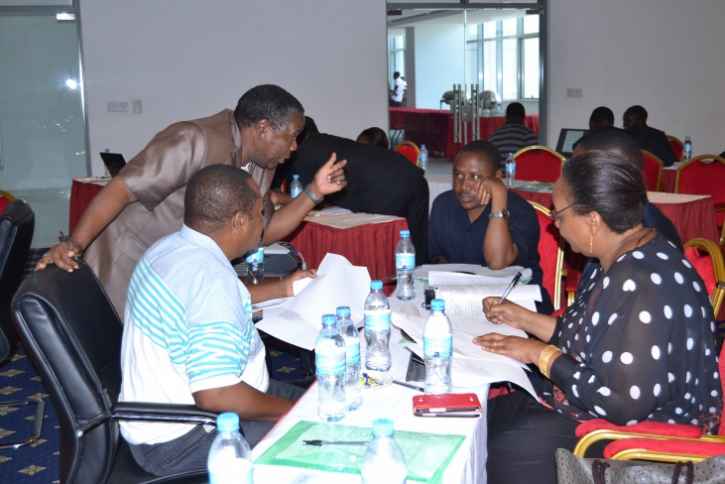You are here:

Supporting pharmaceutical education in Tanzania
Tanzania faces a serious shortage of health care workers including pharmaceutical personnel. For a population of 44.8 million (2010), there are currently only 980 registered pharmacists, 650 pharmaceutical technicians and 350 pharmaceutical assistants. In total, there are only about 135 pharmaceutical technicians and 30 pharmaceutical assistants who graduate each year in the whole country.
An assessment performed in 2012 revealed that local training institutions for pharmaceutical staff face challenges concerning the capacity of student intake and the quality of training due to a shortage of qualified lecturers, insufficient space (lecture halls and labs) and a lack of equipment for labs and libraries. Furthermore, curricula are not keeping up with the changing demand of the health and pharmaceutical sector and are not harmonized among the institutions. As a consequence, the staffing situation in health facilities is unsatisfactory, particularly in rural health facilities which are often run by faith-based organizations.
Hence well-functioning training institutions for pharmaceutical personnel, particularly for pharmaceutical technicians and lower cadre, are crucial to assure an adequately trained health workforce is available to contribute to improved pharmaceutical services. A first step to improve the quality of training would be to implement an updated harmonized curriculum which corresponds to the requirements of the health sector.
Public Private Partnership (PPP)
action medeor, German Medical Aid Organization e.V. coordinates a PPP project that is funded by the “Deutsche Gesellschaft für Internationale Zusammenarbeit” (GIZ GmbH) as well as by three international pharmaceutical companies (Boehringer, Bayer, Merck). The project duration is three years (2014-2016) and the total volume is 400.000 Euros.
The objective of the project is to improve the availability and quality of technical training for pharmaceutical staff according to the demand of the Tanzanian health care sector.
Within the project period, the Kilimanjaro School of Pharmacy (KSP) is supported as a “model school” for development and implementation of a new training curriculum for lower cadre pharmaceutical staff. Furthermore, in order to increase student numbers and to comply with all official requirements of the accrediting authority (National Council for Technical Education / NACTE), a new building will be constructed which shall provide for more laboratory and library space.
In the first project phase, the new competence-based modular curriculum has been revised and harmonized with all relevant stakeholders in Tanzania. Apart from KSP, three further pharmaceutical training institutions (public and faith-based) as well as the Pharmacy Council are extensively involved in the workshops and discussions. In February 2015, the curriculum was officially submitted to the NACTE.
According to the Pharmacy Council, the harmonized curriculum shall be used by all pharmaceutical training institutions (in total 8) in the country from the academic year 2015/16 onwards. The new curriculum is based on the actual demand of the health sector that was discussed in a comprehensive situational analysis workshop which was attended by many stakeholders. Furthermore, the new curriculum facilitates standardization and exchange between the various training institutions.
After one year of training, the students already gain the first official qualification-level, the “dispenser” status. This qualification is being newly introduced as it helps to increase the number of personnel that have at least a minimum pharmaceutical qualification. The modular structure allows students to continue with year two (resulting in the “pharmaceutical assistant” qualification) and year three (the “pharmaceutical technician” qualification) at any time, according to their needs and possibilities.
The current project can be seen as the start of a long-term initiative as the schools need further assistance in adopting the curricula, upgrading their infrastructure and increasing the number of students. It is crucial for the success of the project that the commitment of the local stakeholders remains high and that further investors can be attracted.
Projectinformation:
- Target:
- Improve the capacity and quality of pharmaceutical training in Tanzania according to the demand of the health sector
- Audience:
- Four pharmaceutical training institutions (three faith-based, one public), health facilities especially in rural areas
- Projectarea:
- Tanzania
- Projectdescription:
- Developing, revising and harmonizing a new modular curriculum for a one to three year pharmaceutical training
reaccreditation of the Kilimanjaro School of Pharmacy (KSP) by NACTE
Upgrading and extension of the lab and library at the KSP
Supporting individual schools when specific needs arise - Term of validity:
- April 2014-December 2016
- Projectvolume:
- 418.500 €
- Sponsor:
- GIZ, Bayer, Boehringer, Merck
- Projectnumber:
- 7000118
- Responsible:
- Christine Häfele-Abah